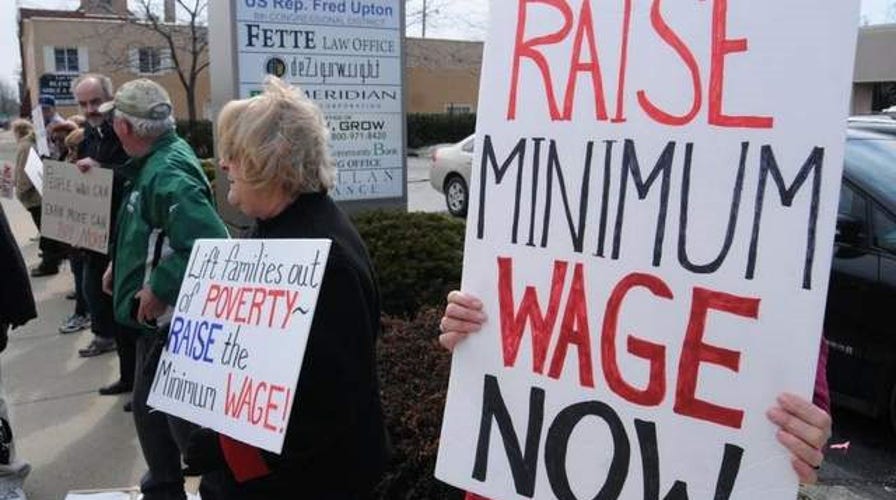Five states put minimum wage hikes on the ballot
Midterms 2014: Former Toys R Us CEO weighs in
This is a rush transcript from "Your World," November 4, 2014. This copy may not be in its final form and may be updated.
NEIL CAVUTO, HOST: Forget candidates on the ballots. Try all the cash, because five states are putting minimum wage hikes right on their ballot today.
Why former Toys "R" Us CEO Jerry Storch says all you workers and all these other states should be watching it closely.
Why, Jerry? Why does it worry you?
JERRY STORCH, FORMER CEO, TOYS "R" US: Well, no one wants to be unfeeling, but it's economically simplistic to think that you can create prosperity simply by waving a wand and basically granting everyone a raise.
CAVUTO: And they're all over the map. Some, it moves to $10, $15.
STORCH: Well, some are up to 40 percent or more.
CAVUTO: Right.
STORCH: And the -- the -- this is a transfer of wealth, which some people are looking for here. But it's not what people think.
It's a transfer of wealth to some of the minimum wage workers who will get a raise, to many of them who will lose their job. And make no -- from many of them who will lose their job. So it's the job losers who are paying for this. And make no mistake about it, they will lose their job, because of globalization. Many of these jobs will be shipped overseas.
Because of automation, many of these jobs will be replaced, and because of the stagnation it creates.
(CROSSTALK)
CAVUTO: Well, that's been happening already. You just say it's something that will hasten the process even more.
STORCH: Well, it's a horrible time to do it, when you have a struggling economy.
CAVUTO: When is a right time to do it, if you do it at all?
STORCH: Well, you could say you want to do it an inflation-adjusted basis to keep it steady.
The last time this happened, by the way, was in 2007, 2008 and 2009, where, over a three-year period, we stepped up the minimum wage by about 40 percent. Now, I won't claim cause and effect, but we all know that was not a good economic time.
CAVUTO: But people picked, as you know, Jerry, the period, whether they are going back to the late '70s, early '70s; 1968 is another year popularly mentioned, that if you adjusted for inflation, people are falling behind the curve.
But you are saying that if you do entertain raising it, you index it to inflation, we could take the whole drama out of this.
STORCH: If you did the same thing and index it to inflation since the last time it was raised...
CAVUTO: Right.
STORCH: ... which would have been in 2009, right, then you would raise it to $7.87 right now, not 40 percent, up to $10.10.
CAVUTO: Not $10 or $15.
STORCH: It's an incredible burden on the entire economy. And it has a ripple effect to jobs beyond the minimum wage employees, as you can't give Mary a raise. The brand-new person who comes on the job can't make $10 an hour and tell Joey, who has been working there for a couple of years, he's not going to get a raise too.
CAVUTO: So, you argue jobs would be lost, but others argue that the higher rates are going to mean people can afford to buy more burgers and fries that help the fast food places that are giving the raises.
STORCH: Well, if that's simple, then they could pass a law in Bangladesh or somewhere and create economic prosperity by giving everyone a raise, but that's not what happens.
If you want to create lasting economic growth in this country or anywhere, you have to invest in human resources, OK, but invest in education, so they can generate true economic value. Invest in infrastructure, so that each employee has more to work with.
CAVUTO: Fair enough.
Jerry, good seeing you again, my friend.
STORCH: It's a pleasure.
CAVUTO: Jerry Storch, the former big chief at Toys "R" Us.
Content and Programming Copyright 2014 Fox News Network, LLC. ALL RIGHTS RESERVED. Copyright 2014 CQ-Roll Call, Inc. All materials herein are protected by United States copyright law and may not be reproduced, distributed, transmitted, displayed, published or broadcast without the prior written permission of CQ-Roll Call. You may not alter or remove any trademark, copyright or other notice from copies of the content.

